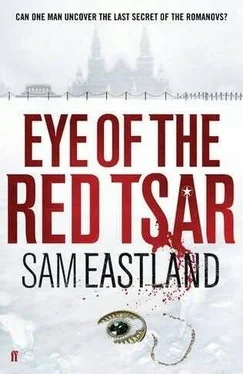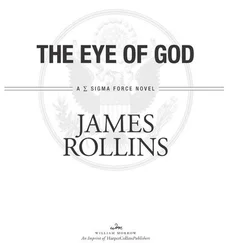“That is exactly why Zubatov chose him. First, he had Grodek arrested in a public place. News of this soon spread. A young man, grabbed off the street and roughly shoved into a waiting car. Anyone witnessing such a thing, and Zubatov made sure there were many of these, would feel sympathy for Grodek. But once Zubatov had him in custody, the real work began.”
“What did he do to the boy?”
“He blindfolded Grodek, put him in a car, and drove him to a secret location. When Zubatov removed Grodek’s blindfold, the Tsar himself was standing there in front of them.”
“What was the point of that?” asked Kirov.
“Zubatov brought Grodek face-to-face with a man who had become only a symbol to him. But to see him there, as a man of flesh and blood, instead of what Grodek’s father had made him out to be, that was the beginning of the process. The Tsar explained his own version of events. Together, they looked over his father’s record books, which showed, in the father’s own handwriting, how his family’s wealth had been squandered. Of course, Grodek had never seen any of these things before. It left a deep impression on them both to be reminded that they were part of the same family.”
“And was Grodek convinced by all this?”
“Yes,” replied Pekkala. “And it was then that Zubatov explained his plan to Grodek. He was to be what is known as an ‘agent provocateur’ and would act as the ringleader of this fake terrorist cell. It was extremely dangerous. If any of these assassins caught wind of the fact that Grodek was really working for the Okhrana, his life would have been over in a second. But young men are attracted to danger, and when Grodek agreed to lead this band of terrorists, Zubatov believed that he had chosen wisely. In reality, it turned out to be the greatest mistake of his life.”
“Why?” Kirov was fascinated.
“Over the next year,” continued Pekkala, “Grodek underwent training with the Special Section of the Okhrana. In order to be convincing as a terrorist, he had to be able to behave like one. They taught him how to make bombs, how to shoot, how to fight with a knife, just as they taught me. Soon after the terrorist cell was activated, people came forward to enlist. Grodek was a natural. He possessed a kind of energy that drew people to him. In the months ahead, while the membership of this cell continued to grow, Grodek surpassed every goal Zubatov had set for him. He never missed a meeting with his contacts, and the information he supplied was so accurate that Zubatov spoke of Grodek as the person who would one day take his place at the head of the Okhrana. But Zubatov had made one great miscalculation. After proving to Grodek that the blame for his family’s misfortune belonged entirely with his father, Zubatov had assumed that Grodek’s hatred of the Tsar had been extinguished. What Zubatov did not realize was that Grodek, after seeing the evidence laid before him, had decided to blame them both.
“In the meantime, Grodek had also made a mistake. He had fallen in love with one of the women he recruited. Her name was Maria Balka. She was fifteen years older than Grodek and, in many ways, more dangerous than Grodek himself. She had already carried out several killings in the name of various anarchist groups. Grodek kept their relationship a secret from Zubatov, and when Zubatov mentioned to Grodek that Maria Balka would certainly receive the death penalty after she was arrested along with the other members of Grodek’s organization, it made what happened next almost inevitable.”
“What did happen?” asked Kirov.
“Zubatov decided that the trap could only be sprung after an attempt on the life of the Tsar. This would provide justification for the arrests which would follow. Of course, it was arranged that Grodek would carry out the attempt. It would be made to appear that the Tsar had actually been assassinated. Other members of the terrorist cell would be stationed nearby, in order to witness the staged killing. The assassins would then rendezvous at their safe house, where they would be arrested by agents of the Okhrana.
“The attack was to take place as the Tsar took an evening walk around the grounds of the Summer Palace. Zubatov made sure that the Tsar stuck to a regular route on these walks, in order to make the terrorists confident of success. The Tsar would be shot as he passed between the gates which surrounded the palace and the Lamski Pond. This was a relatively narrow area, which offered the Tsar no protection. Firing through the gates, Grodek would only be a few paces from the Tsar.”
“But wouldn’t it seem suspicious that the Tsar would be out walking by himself?”
“Not at all,” replied Pekkala. “He set aside a portion of each day to exercise. Sometimes it was riding, sometimes swimming, but often he would walk the grounds of the palace, whatever the weather, and at those times he insisted on being alone.”
“But what about the other assassins? Wouldn’t they be armed as well?”
“They were instructed to fire only if Grodek missed his target. The Tsar would be seen to fall, struck by several rounds, but of course only blank ammunition would be used.
“At this point, no one had any doubts about Grodek’s loyalty to the Okhrana. After all, he had delivered the names of every member of the organization he had helped to create. He had betrayed them all, as he had promised to do from the beginning.
“What nobody in the Okhrana knew was that Grodek had switched out the blanks for real bullets.
“The night of the shooting, everything went like clockwork. The terrorists were allowed to approach the palace grounds. They hid. The Tsar set out on his walk. Meanwhile, dozens of Okhrana agents waited to swoop down on the safe house. The Tsar reached the narrow walkway between the gates and the Lamski Pond. The sun had set. A cool wind blew across the pond. Grodek stepped out of the shadows. The Tsar paused. He had heard the sound of branches rustling. Grodek stepped up to the gate, reached between the bars, the gun in his hand. The Tsar never moved. He stood there, as if he didn’t understand what was happening.”
“And he missed?” stammered Kirov. “Grodek missed at a range of three paces?”
Pekkala shook his head. “Grodek did not miss. He emptied the cylinder. All six shots found their mark.”
Now Kirov jumped to his feet. “Do you mean to tell me that he shot the Tsar six times and did not kill him?”
“The man Grodek killed was not the Tsar.”
“Then who…” Kirov narrowed his eyes as the truth dawned on him. “You mean a double? Grodek shot a double?”
“Zubatov made many mistakes, but he would not go so far as to actually endanger the life of the Tsar. That was the one part of the plan Zubatov never discussed with Grodek. When Grodek pulled the trigger, he did not know he was killing a double.”
“But still a man died,” Kirov insisted.
“Somebody usually does,” replied Pekkala.
Pekkala and the Tsar stood in the darkness on the balcony of the Palace, looking out over the grounds. They could see the Chinese Bridge and Parnassus Hill. In the Gribok gardens, straight ahead of them, leaves rustled in the night breeze.
At that moment, they knew, the Tsar’s double would be walking just inside the gates of the Palace grounds, between the Great Pond and the Parkovaya Road.
Neither man had spoken for a while.
The air was tense as they waited for the shooting to begin.
“Can you imagine how it is,” asked the Tsar, “that I cannot venture out beyond the gates of this palace without knowing I would probably be killed? I am the ruler of a country along whose streets I cannot walk alone.” He waved his hand back and forth out over the grounds, in a way which reminded Pekkala of a priest swinging an incense holder. “Is it worth all this? Is it worth anything at all?”
Читать дальше










